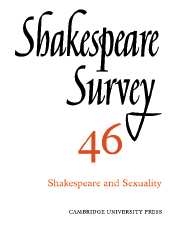Book contents
- Frontmatter
- Shakespeare and Sexuality
- As Who Liked It?
- Malvolio and the Eunuchs: Texts and Revels in Twelfth Night
- The Scandal of Shakespeare’s Sonnets
- Weaving and Writing in Othello
- ‘That’s She that was Myself’: Not-so-Famous Last Words and Some Ends of Othello
- ‘The Catastrophe is a Nuptial’: The Space of Masculine Desire in Othello, Cymbeline, and The Winter’s Tale
- Reconstructing The Winter’s Tale
- Late Shakespeare: Style and the Sexes
- The Virgin Not: Language and Sexuality in Shakespeare
- Fleshing his Will in the Spoil of her Honour: Desire, Misogyny, and the Perils of Chivalry
- Bowdler and Britannia: Shakespeare and the National Libido
- Shakespeare and the Ten Modes of Scepticism
- Shakespeare Performances in England, 1992
- Professional Shakespeare Productions in the British Isles, January-December 1991
- 1 Critical Studies
- 2 Shakespeare’s Life, Times, and Stage
- 3 Editions and Textual Studies
- Books Received
- Index
3 - Editions and Textual Studies
Published online by Cambridge University Press: 28 March 2007
- Frontmatter
- Shakespeare and Sexuality
- As Who Liked It?
- Malvolio and the Eunuchs: Texts and Revels in Twelfth Night
- The Scandal of Shakespeare’s Sonnets
- Weaving and Writing in Othello
- ‘That’s She that was Myself’: Not-so-Famous Last Words and Some Ends of Othello
- ‘The Catastrophe is a Nuptial’: The Space of Masculine Desire in Othello, Cymbeline, and The Winter’s Tale
- Reconstructing The Winter’s Tale
- Late Shakespeare: Style and the Sexes
- The Virgin Not: Language and Sexuality in Shakespeare
- Fleshing his Will in the Spoil of her Honour: Desire, Misogyny, and the Perils of Chivalry
- Bowdler and Britannia: Shakespeare and the National Libido
- Shakespeare and the Ten Modes of Scepticism
- Shakespeare Performances in England, 1992
- Professional Shakespeare Productions in the British Isles, January-December 1991
- 1 Critical Studies
- 2 Shakespeare’s Life, Times, and Stage
- 3 Editions and Textual Studies
- Books Received
- Index
Summary
Five more volumes from the New Cambridge Shakespeare bring the series past the half-way mark. All the editions are worth having and represent an enormous amount of valuable editorial and critical work: some can for the moment claim their place as the best available edition. The introductions are on the whole useful, even if some contain material which would be better suited to a periodical article rather than to an edition which undergraduates will buy and use. The textual introductions are rather good, but the handling of questions such as date and occasion is very patchy. Some editors go to great lengths to investigate the history of their play in the theatre, often turning up new and diverting information, but only Hattaway manages to use the history to illuminate the play itself.
The series also contains a number of minor but still irritating inconsistencies. The asterisk in the commentary, used to indicate editorial emendation, appears to have been silently dropped: it is present in 2 Henry VI but not in Measure for Measure (both published in 1991) nor in The Poems or Henry V. Use of the Oxford edition of the complete works is still sporadic. Relined verse, verse set as prose, and prose as verse, are sometimes recorded fully and sometimes only occasionally: the same is true for the recording of stage directions and of spelling variants. In the note on 2.4.186 Gibbons reports the sententiae marked by the Folio in Measure for Measure, but Roe ignores their presence in his collations and commentary to Lucrece.
- Type
- Chapter
- Information
- Shakespeare Survey , pp. 241 - 258Publisher: Cambridge University PressPrint publication year: 1993



